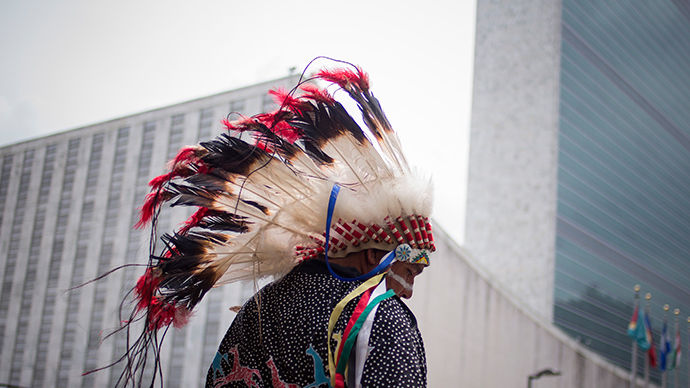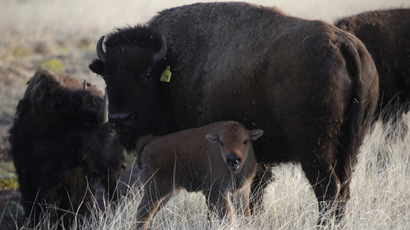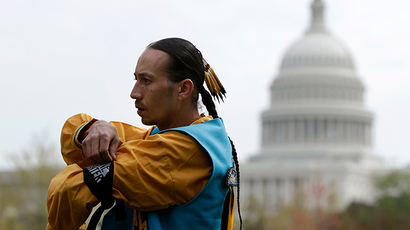Arizona rep. offends Native Americans by calling them ‘wards of federal govt’

In an Arizona community meeting, Rep. Paul Gosar made a controversial remark that offended Native Americans in attendance and across the country when he called them ‘wards of the federal government’.
The Republican representative, as well as one of his Democratic counterparts, Rep. Ann Kirkpatrick, held a roundtable discussion in the northern Arizona city of Flagstaff. The legislators were defending a contentious land-swap bill that they co-sponsored. The language was absorbed into the National Defense Authorization Act (NDAA), which the House of Representatives passed last Thursday.
At the meeting, Phil Stago, a member of the White Mountain Apache Tribe, called the bill disrespectful to tribal sovereignty.
“I don’t like our ancestral lands being raided by the US Congress,” he said, according to the Arizona Daily Sun.
Gosar responded that archaeological and historical investigations had found no documented proof that the area was sacred to the Apache Tribe. In response to Stago’s sovereignty concerns he said, “You’re still wards of the federal government.”
Stago told the Associated Press that the phrase is antiquated and ignores advances made in tribes managing their own affairs and seeking equal representation when it comes to projects proposed on land they consider sacred.
"He kind of revealed the truth — the true deep feeling of the federal government: 'Tribes, you can call yourselves sovereign nations, but when it comes down to the final test, you're not really sovereign because we still have plenary authority over you’," Stago said.
Gosar spokesman Steven Smith said that wasn't the congressman’s intent. Arizona’s 4th Congressional District includes constituents from Apache tribes.
"If that's what he got out of that, I think it's misconstrued," Smith said to AP. "If you look at the work the congressman has done, that's far from the truth."
Smith added that Gosar has been an advocate for strengthening the relationship between tribes and the federal government, including sponsoring legislation to do just that.

The Arizona representative’s “wards of the federal government” comment was true once upon a time… nearly two centuries ago. In the Supreme Court’s 1831 decision in Cherokee Nation v. State of Georgia, Chief Justice John Marshall wrote that Native American tribes be named “domestic dependent nations” because they “look to our government for protection; rely upon its kindness and its power; appeal to it for relief to their wants; and address the President as their great father.”
But the US has been moving away from that position for the past nine decades. Indeed, the Indian Commerce Clause of the US Constitution recognizes that tribal governments are sovereign nations. This was reiterated with the 1924 Indian Citizenship Act, which declared Native Americans to be US citizens.
Regardless of whether tribes are considered sovereign nations or domestic dependent nations, the tribal members themselves were never considered wards of the government. To do so “treats them differently than every other American,” according to Indianz.com, a website that provides news “from a Native American perspective.”
However, the federal government ‒ through the Interior Department’s Bureau of Indian Affairs ‒ still maintains control over tribal affairs as a trustee of Native American property.
Troy Eid, a Republican and former US attorney in Colorado, told AP that the language that defines core concepts of Indian law is old and often ethnically offensive.
"That's just not appropriate," he said about Gosar’s comment. "In the heated context of what this represents, it's especially inappropriate to be resorting to what amounts to race baiting."
Sam Deloria, a member of the Standing Rock Sioux Tribe who served for 35 years as director of the American Indian Law Center in Albuquerque, New Mexico, agreed. Calling Native Americans government wards "doesn't contribute much to the debate," he said.
The legislation Gosar and Kirkpatrick defended at the meeting would exchange 2,400 acres of Tonto National Forest (in the southeast of the state) for about 5,300 acres of environmentally-sensitive land throughout the state controlled by Resolution Copper, a subsidiary of global mining giant Rio Tinto. The result would pave the way for the country’s largest copper mine.
The Senate advanced the NDAA on Thursday, with a final vote on the bill expected no later than Friday. The land-exchange language is contained in upper house’s legislation as well.














